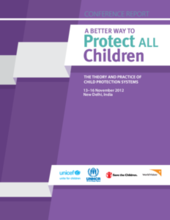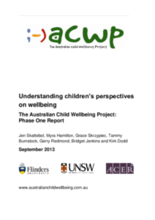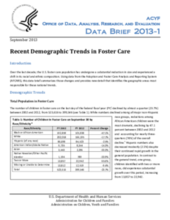Displaying 12641 - 12650 of 14580
This report just issued by the Child Protection Working Group presents the main findings of an interagency child protection assessment for Syria, covering the period February- May 2013. The report provides findings on key thematic areas: psychosocial wellbeing, physical violence, children associated with armed forces and armed groups, child marriage, sexual violence, child labour, separation from caregivers and access to basic services and information.
While adoptions to the United States are in steep decline, more U.S. children are being adopted abroad in countries such as the Netherlands. Most of the U.S.
This report of a major conference held in New Delhi in November 2012 entitled “A Better Way to Protect ALL Children: The Theory and Practice of Child Protection Systems”, encapsulates the substantive content of the presentations and related discussion; provides an analysis and documents the journey; and suggest an agenda, or at least direction, for future work on Child Protection systems.
This Washington Post article discusses the findings from a major report by the National Academy of Science on child abuse and neglect that found that advances in brain research showed that child abuse and neglect damages not only the way a developing child’s brain functions, but changes the actual structure of the brain itself.
This document reports on Phase One of the Australian Child Wellbeing Project, a child-centred study in which young people’s perspectives are being used to design a major nationally representative survey of wellbeing among 8-14 year olds, and to interpret findings from that survey. It uses focus groups and in-depth interviews with young people in six groups who are often seen as experiencing high levels of marginalisation or as having particular experiences and needs, including young people living in out of home care and young people living with disability.
Over the last decade, the U.S. foster care population has undergone a substantial reduction in size and experienced a shift in its racial and ethnic composition. Using data from the Adoption and Foster Care Analysis and Reporting System (AFCARS), this data brief summarizes those changes and provides new detail that identifies the geographic areas most responsible for these national trends.
This chart produced by the US Government's Children's Bureau includes data submitted to the Adoption and Foster Care Analysis and Reporting System (AFCARS) by US States, the District of Columbia and Puerto Rico by July 19, 2013.
Save the Children seeks qualified consultant(s) to undertake a comprehensive technical assistance program on alternative care for orphaned and vulnerable children in Liberia. The successful candidate (s) will partner with Save the Children, World Learning and the Department of Social Welfare (DSW) to describe and assess the current system/activities of the DSW, analyze the existing legal framework, guidelines, protocols, and actors, and produce detailed recommendations for the DSW to develop a comprehensive alternative care system.
The present study explored the changes resulting from the Teenage Mothers Project (TMP) in Eastern Uganda, a program that empowers unmarried teenage mothers to cope with the consequences of early pregnancy and motherhood, as well as factors that either enabled or inhibited these changes.
This series of articles by Reuters investigates the disturbing practice of 'private re-homing' of adopted children in the USA, particularly affecting children adopted from overseas. 'Re-homing' also called 'adoption disruption' refers to adoptive parents abandoning their children and handing them out to other adults, often found through internet and social media fora, without any type of formal vetting or procedures.






